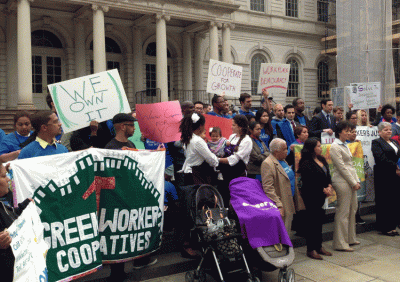
In 2006, Daniela Salazar, then a 22-year-old mother of two, was making about $7.25 an hour doing restaurant work and housecleaning. For three hours every month, she also stood on the street in Brooklyn with 12 other women passing out flyers, rain or shine (and sometimes snow).
They were promoting a cleaning company of a new kind: one that would not only provide them with jobs and more money to support their families, but would also make them business owners.
That company was a worker cooperative called Sí Se Puede—“Yes, We Can” in Spanish. The women started the co-op with the help of the SCO Family of Services’ Center for Family Life, a social-service agency and advocacy group for families. They marketed their business in this low-tech way for months, slowly building up a clientele until they could afford a website.
Eight years later, Sí Se Puede has 64 member-owners. It grossed over a million dollars in 2013. The worker co-op may soon have another source of income: a line of cleaning products. Salazar’s pay at Sí Se Puede has climbed to $20 to $23 an hour, letting her work fewer hours a week and spend more time with her family, which has grown to include three children.
Read the full article at In These Times
Go to the GEO front page

Add new comment